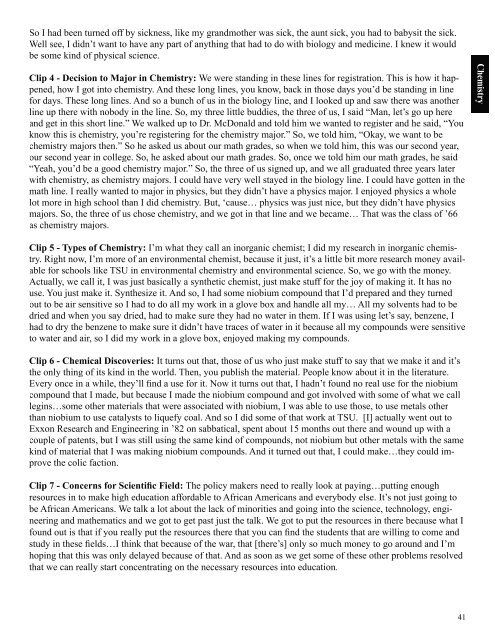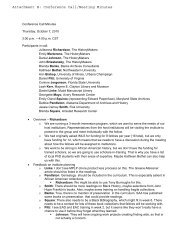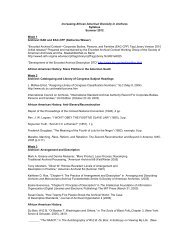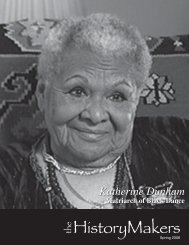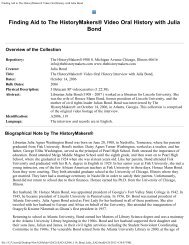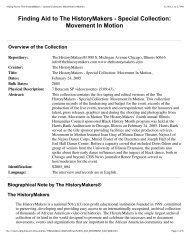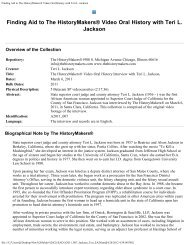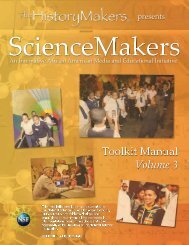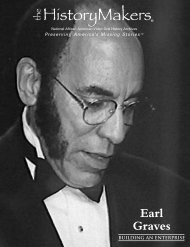ScienceMakers Toolkit Manual - The History Makers
ScienceMakers Toolkit Manual - The History Makers
ScienceMakers Toolkit Manual - The History Makers
You also want an ePaper? Increase the reach of your titles
YUMPU automatically turns print PDFs into web optimized ePapers that Google loves.
So I had been turned off by sickness, like my grandmother was sick, the aunt sick, you had to babysit the sick.<br />
Well see, I didn’t want to have any part of anything that had to do with biology and medicine. I knew it would<br />
be some kind of physical science.<br />
Clip 4 - Decision to Major in Chemistry: We were standing in these lines for registration. This is how it happened,<br />
how I got into chemistry. And these long lines, you know, back in those days you’d be standing in line<br />
for days. <strong>The</strong>se long lines. And so a bunch of us in the biology line, and I looked up and saw there was another<br />
line up there with nobody in the line. So, my three little buddies, the three of us, I said “Man, let’s go up here<br />
and get in this short line.” We walked up to Dr. McDonald and told him we wanted to register and he said, “You<br />
know this is chemistry, you’re registering for the chemistry major.” So, we told him, “Okay, we want to be<br />
chemistry majors then.” So he asked us about our math grades, so when we told him, this was our second year,<br />
our second year in college. So, he asked about our math grades. So, once we told him our math grades, he said<br />
“Yeah, you’d be a good chemistry major.” So, the three of us signed up, and we all graduated three years later<br />
with chemistry, as chemistry majors. I could have very well stayed in the biology line. I could have gotten in the<br />
math line. I really wanted to major in physics, but they didn’t have a physics major. I enjoyed physics a whole<br />
lot more in high school than I did chemistry. But, ‘cause… physics was just nice, but they didn’t have physics<br />
majors. So, the three of us chose chemistry, and we got in that line and we became… That was the class of ’66<br />
as chemistry majors.<br />
Clip 5 - Types of Chemistry: I’m what they call an inorganic chemist; I did my research in inorganic chemistry.<br />
Right now, I’m more of an environmental chemist, because it just, it’s a little bit more research money available<br />
for schools like TSU in environmental chemistry and environmental science. So, we go with the money.<br />
Actually, we call it, I was just basically a synthetic chemist, just make stuff for the joy of making it. It has no<br />
use. You just make it. Synthesize it. And so, I had some niobium compound that I’d prepared and they turned<br />
out to be air sensitive so I had to do all my work in a glove box and handle all my… All my solvents had to be<br />
dried and when you say dried, had to make sure they had no water in them. If I was using let’s say, benzene, I<br />
had to dry the benzene to make sure it didn’t have traces of water in it because all my compounds were sensitive<br />
to water and air, so I did my work in a glove box, enjoyed making my compounds.<br />
Clip 6 - Chemical Discoveries: It turns out that, those of us who just make stuff to say that we make it and it’s<br />
the only thing of its kind in the world. <strong>The</strong>n, you publish the material. People know about it in the literature.<br />
Every once in a while, they’ll fi nd a use for it. Now it turns out that, I hadn’t found no real use for the niobium<br />
compound that I made, but because I made the niobium compound and got involved with some of what we call<br />
legins…some other materials that were associated with niobium, I was able to use those, to use metals other<br />
than niobium to use catalysts to liquefy coal. And so I did some of that work at TSU. [I] actually went out to<br />
Exxon Research and Engineering in ’82 on sabbatical, spent about 15 months out there and wound up with a<br />
couple of patents, but I was still using the same kind of compounds, not niobium but other metals with the same<br />
kind of material that I was making niobium compounds. And it turned out that, I could make…they could improve<br />
the colic faction.<br />
Clip 7 - Concerns for Scientifi c Field: <strong>The</strong> policy makers need to really look at paying…putting enough<br />
resources in to make high education affordable to African Americans and everybody else. It’s not just going to<br />
be African Americans. We talk a lot about the lack of minorities and going into the science, technology, engineering<br />
and mathematics and we got to get past just the talk. We got to put the resources in there because what I<br />
found out is that if you really put the resources there that you can fi nd the students that are willing to come and<br />
study in these fi elds…I think that because of the war, that [there’s] only so much money to go around and I’m<br />
hoping that this was only delayed because of that. And as soon as we get some of these other problems resolved<br />
that we can really start concentrating on the necessary resources into education.<br />
41<br />
Chemistry


